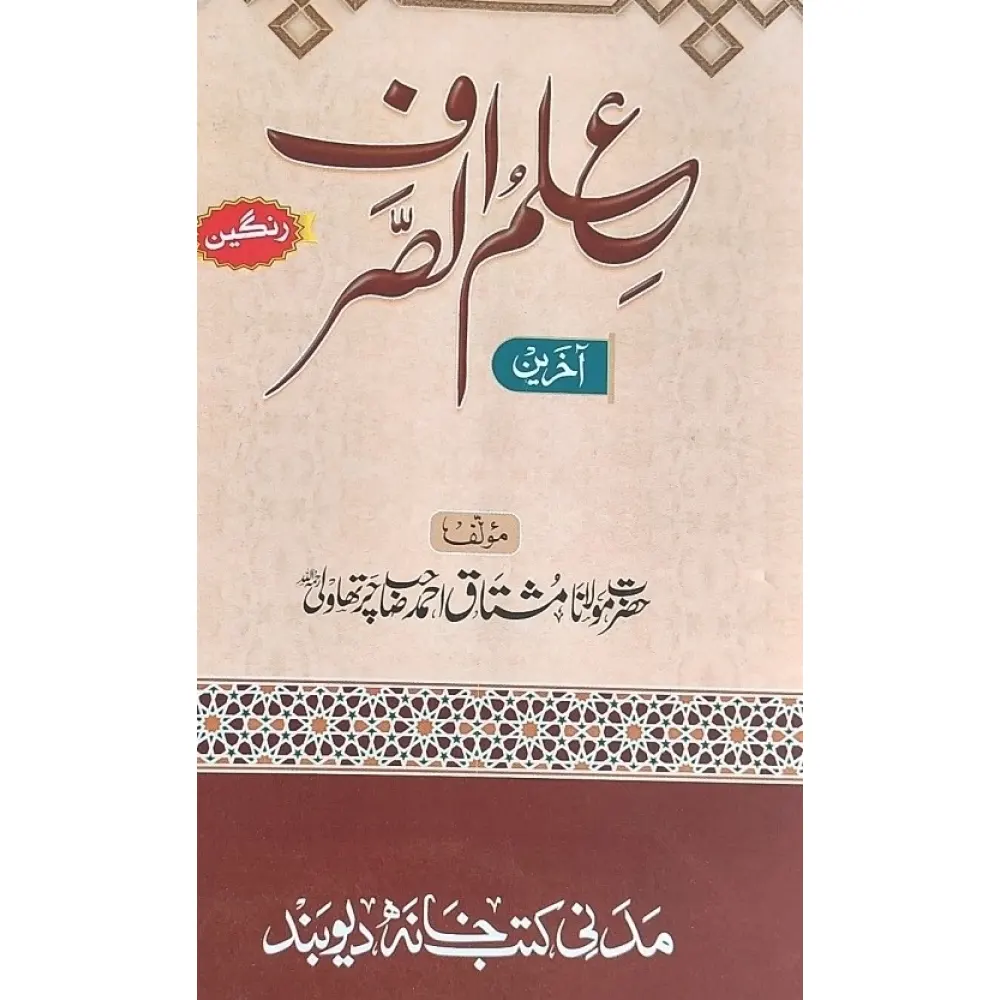Khilafate Rashida Mufti Zainul Abideen Deoband
₹200.00 Original price was: ₹200.00.₹140.00Current price is: ₹140.00.
- Name: Khilafate Rashida
- Writer : Mufti Zainul Abideen
- Publisher: Deoband
- Language: Urdu

Khilafate Rashida Mufti Zainul Abideen Deoband
₹200.00Original price was: ₹200.00.₹140.00Current price is: ₹140.00.Request a Call Back
This contact form is available only for logged in users.
- Delivery & Return
How Does The Delivery Process Work ?
- Once Our System Processes Your Order, Your Products Are Inspected Thoroughly To Ensure They Are In Perfect Condition.
- After They Pass Through The Final Round Of Quality Checks, They Are Packed And Handed Over To Our Trusted Courier Partners.
- Our Delivery Partners Then Bring The Package To You At The Earliest Possibility. In Case, They Are Unable To Reach Your Provided Address Or At A Suitable Time, They Will Contact You To Resolve The Issue.
How Are Items Packed ?
We Package Our Products In Corrugated Boxes, Which Are Covered With 3 Layer Protection. Each Individual Product Is Packed In Bubble Wrap While Fragile Items Like Bottles Are Safely Secured With Additional Bubble Wrap. We Pride Ourselves On The Quality Of Our Packaging.What Is The Range Of Locations To Which Daarul Kitab & Islamic Store Ships It’s Products ?
We Shipped Our Products Pan India!My Order Has Been Shipped, How Can I Track It ?
Once Your Order Has Been Dispatched, You Will Receive An Email And SMS With Tracking Details.You Can Track The Status Of Your Order Within 24 – 48 Hours After Your Order Is Dispatched From Our Warehouse.Following Are Some Of Our Trusted Courier Partners: eKart Logistics, BlueDart, Delhivery, Xpressbees, Ecom Express, DTDC & ShadowfaxWhat Is The Estimated Delivery Time ?
It Takes 3-7 Business Days To Deliver The Order Once Order Has Been Dispatched.Though We Keep 95% Of Our Catalog In Our Inventory, Certain Products Need To Be Sourced Directly From The Brand Itself So That We Can Live Up To Our Promise Of Providing Fresh, Non-expired Products.Are There Any Shipping Charges Applicable To My Order ?
We Have Different Shipping Charges For Different Zones Which Start From 60₹ To 100₹ Is Applied To All Orders Below ₹1999, While There Is Free Shipping For All Orders Above ₹1999Note: Please Take A Video/Photos While Opening A Order You Received We Need It If Anything Goes Wrong With You Order Between Journey Of Our Warehouse To Your Doorstep, If You Find Order Is Damaged Or Intact Please Do Not Accept The Order Delivery .
Disclaimer: Any Complaints Related To Product/Delivery Should Be Brought To Our Notice Within 48 Hours From The Time Of Delivery.
Help
Give us a shout if you have any other questions and/or concerns. Email: support@daarulkitab.com Phone: +918755553311 WhatsApp: +918755553311 - Ask a Question

Khilafate Rashida Mufti Zainul Abideen Deoband
₹200.00Original price was: ₹200.00.₹140.00Current price is: ₹140.00.Ask a Question
This contact form is available only for logged in users.
Khilafate Rashida Mufti Zainul Abideen Deoband
Overview: “Khilafate Rashida” delves into the concept of the Rashidun Caliphate and its significance in Islamic history. The book provides a detailed account of the lives, contributions, and leadership of the first four caliphs of Islam, known as the Rashidun (rightly guided) Caliphs. These caliphs are Abu Bakr, Umar ibn al-Khattab, Uthman ibn Affan, and Ali ibn Abi Talib. The book aims to highlight their impact on the Muslim community and the development of the early Islamic state.
Key Themes:
- Historical Context:
- The book sets the historical context for the Rashidun Caliphate, explaining the events leading up to the establishment of the caliphate after the death of Prophet Muhammad (PBUH).
- Life and Contributions of the Caliphs:
- Abu Bakr: Details his early life, close companionship with Prophet Muhammad (PBUH), and his role as the first caliph. Highlights his efforts in unifying the Muslim community and preserving the teachings of Islam.
- Umar ibn al-Khattab: Explores his remarkable leadership qualities, administrative reforms, and significant contributions to the expansion and consolidation of the Islamic state.
- Uthman ibn Affan: Discusses his contributions to the compilation of the Quran and his role in maintaining the unity of the Muslim Ummah during his caliphate.
- Ali ibn Abi Talib: Highlights his wisdom, piety, and efforts to uphold justice and equity during his caliphate, despite facing significant internal challenges.
- Principles of Governance:
- The book examines the principles of governance followed by the Rashidun Caliphs, emphasizing their commitment to justice, equality, and the welfare of the people. It discusses their approach to leadership, decision-making, and conflict resolution.
- Legacy and Impact:
- The book reflects on the lasting legacy of the Rashidun Caliphate and its impact on the subsequent development of Islamic civilization. It highlights how their leadership and policies continue to inspire Muslims around the world.
- Challenges and Lessons:
- Explores the challenges faced by each caliph during their tenure and the lessons that can be learned from their experiences. The book emphasizes the importance of steadfastness, faith, and adherence to Islamic principles in the face of adversity.
Purpose: The primary purpose of the book is to provide readers with a comprehensive understanding of the Rashidun Caliphate and the exemplary leadership of the first four caliphs. Mufti Zainul Abideen Deoband aims to inspire readers by highlighting the values and principles upheld by these caliphs, encouraging them to apply these lessons in their own lives.
| Weight | 150 g |
|---|---|
| Dimensions | 10 × 10 × 10 cm |
Related Products
- Title: Aap Umrah Kaise Karen?
- Publisher: Islamic Book Services
1 in stock
- Hardcover
- Publisher: Al-Hasanat; 1 edition (2016)
1 in stock
- Publisher: Islamic Book Service (2014)
1 in stock
- 365 Prophet Muhammad Stories (Hb)
1 in stock
1 in stock
- Parents : Islamic Rights & Responsibilities
1 in stock
- 16 Surah Shareef Ibs Arabic/Urdu
1 in stock
300 Sawal Jawab Baraye Miyan Biwi (Hafiz Abdullah Saleem) Al Hasanat Urdu
- Effective Communication: Communication is the cornerstone of any healthy relationship. The book provides guidance on how spouses can express their feelings and concerns effectively while maintaining respect and empathy. It also offers tips on avoiding misunderstandings and resolving conflicts peacefully.
- Roles and Responsibilities: The book outlines the roles of husbands and wives as prescribed in Islamic teachings. It emphasizes the importance of fulfilling one’s duties while supporting the other partner, ensuring that both spouses work together to create a balanced and harmonious household.
- Love and Emotional Intimacy: Emotional intimacy is an essential aspect of marriage. The book provides practical advice on how to maintain a loving and respectful relationship, highlighting the value of compassion, care, and understanding.
- Conflict Resolution: Conflicts are inevitable in any marriage, but how they are handled determines the strength of the relationship. The book offers strategies for addressing disputes constructively, encouraging forgiveness, patience, and reconciliation.
- Spiritual Growth: Marriage is seen as a partnership that not only fulfills worldly needs but also contributes to spiritual growth. The book encourages couples to engage in acts of worship together, such as praying, reading the Quran, and seeking knowledge, to strengthen their bond with Allah and each other.
- Family and Social Life: The book also touches on topics related to family dynamics, parenting, and interacting with extended family and community. It provides guidance on how to balance the responsibilities of married life with other social obligations.
1 in stock
- Hardcover
- Publisher: Idara Impex (2014)
- Language: English
3 in stock
- Paperback
- Publisher: Idara impex (2006)
- Language: English
3 in stock
- A Gift For Muslim Bride & Groom Idara (English)
3 in stock














